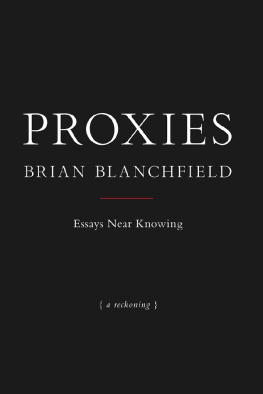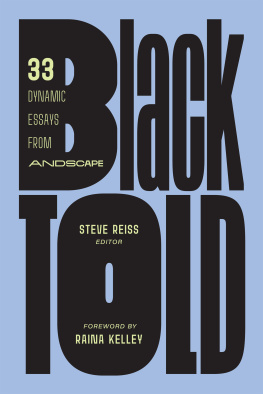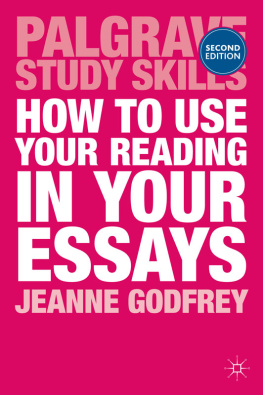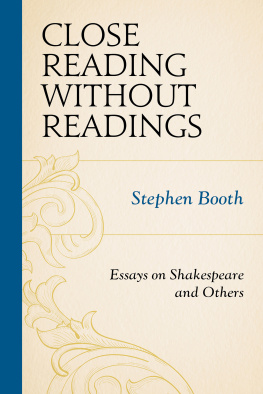Blanchfield - Proxies: essays near knowing
Here you can read online Blanchfield - Proxies: essays near knowing full text of the book (entire story) in english for free. Download pdf and epub, get meaning, cover and reviews about this ebook. City: New York, year: 2016, publisher: Nightboat Books, genre: Detective and thriller. Description of the work, (preface) as well as reviews are available. Best literature library LitArk.com created for fans of good reading and offers a wide selection of genres:
Romance novel
Science fiction
Adventure
Detective
Science
History
Home and family
Prose
Art
Politics
Computer
Non-fiction
Religion
Business
Children
Humor
Choose a favorite category and find really read worthwhile books. Enjoy immersion in the world of imagination, feel the emotions of the characters or learn something new for yourself, make an fascinating discovery.
- Book:Proxies: essays near knowing
- Author:
- Publisher:Nightboat Books
- Genre:
- Year:2016
- City:New York
- Rating:5 / 5
- Favourites:Add to favourites
- Your mark:
- 100
- 1
- 2
- 3
- 4
- 5
Proxies: essays near knowing: summary, description and annotation
We offer to read an annotation, description, summary or preface (depends on what the author of the book "Proxies: essays near knowing" wrote himself). If you haven't found the necessary information about the book — write in the comments, we will try to find it.
A go-for-broke essay collection that blends cultural close reading and dicey autobiography
Proxies: essays near knowing — read online for free the complete book (whole text) full work
Below is the text of the book, divided by pages. System saving the place of the last page read, allows you to conveniently read the book "Proxies: essays near knowing" online for free, without having to search again every time where you left off. Put a bookmark, and you can go to the page where you finished reading at any time.
Font size:
Interval:
Bookmark:

[ acknowledgments ]
I would like to thank Mnica de la Torre, Liz Johnston, Nadia Szilvassy, Aisha Sabatini Sloan, Emily Cooke, M-C MacPhee, Robert Andrew Perez, Peter Burghardt, Michael Snediker, Paul Vangelisti, Danniel Schoonebeek, John DAgata, Paul Lisicky, Bradford Morrow, Micaela Morrissette, and Matthew Burgesseditors of the following publications in which these essays first appeared: BOMB, Brick, Guernica, Harpers, NoMorePotlucks, Oar, The Offing, Or: A Literary Tabloid, the PEN Poetry Series, The Seneca Review, StoryQuarterly, Web Conjunctions, and Dream Closet: Meditations on Childhood Spaces (Secretary Press, 2015).
Correction. was first published as an e-chapbook by Essay Press in 2016. Thanks to Andy Fitch.
Myself is not the single source, not hardly, of what I found I needed to write this book. For their encouragement, advice, and support I am deeply grateful to many.
Above all, John Myers. Who, when it was time, set the tumbleweed free with me.
Stephen Motika, for believing in the project of the book.
Emery Jones, for believing in the greater project. Mirto Stone, who asked for a better opposite of expert.
Maggie Nelson. Chris Nealon. Jason Zuzga. Karen Brennan. Boyer Rickel. At every step.
Samuel Ace, Beth Alvarado, Brett Bell, Matthew Burgess, Justin Cavin, Barbara Cully, Hannah Ensor, Jesse Aron Green, Annie Guthrie, Annie Gwynne-Vaughan, Jacob Kahn, Aaron Kunin, Farid Matuk, Vestal McIntyre, Molly McKasson, Jane Miller, Robert E. Moore, Eileen Myles, Mary Jane Nealon, Lou Pepe, John Pluecker, Claudia Rankine, Allan Reeder, Ben Rutherfurd, Prageeta Sharma, Richard Siken, Aisha Sloan, Doug Stockstill, TC Tolbert, Matias Viegener, Jacqueline Waters, Ken White: thank you.
And to Mary Austin Speaker, Justin Hargett, Lindsey Boldt, and Anne Cherry: Im indebted to your artistry, effort, and know-how.
My great gratitude, finally, to the George A. and Eliza Gardner Howard Foundation for its generous support.
In loving memory of Irene Lawson Overby (19282014). In loving memory of Jeremy Isajiw (19782014).
[ A Note ]
At the end of this book there is a rolling endnote called Correction. It sets right muchalmost certainly not allof what between here and there I get wrong. It runs to twenty-one pages. It may still be running.
Susceptibility to error is a hazard inherent to Proxies. From the beginning (the first of these single-subject essays were written in 2009 and the majority were written in the years 201315), I decided on a total suppression of recourse to other authoritative sources. I wrote these essays with the internet off. I determined not to review again the books and other works I consulted in memory, and I did not stop thinking through the subject at hand to verify assertions or ground speculation or firm up approximations. Que sais-je?, Montaigne asked his library shelves one day late in the sixteenth century, and increasingly that seems a good start.
Having determined that this would be unresearched essaying, analytic but nonacademic, I was almost immediately drawn to a second constraintor, better, invitation: to stay with the subject until it gives onto an area of personal uneasiness, a site of vulnerability, and keep unpacking from there. The formula I found for titling the individual essays was generated very early on, to operate this request of self. Clumsy as it may be, I claim as part of a personal sortilege a devotion to the words I had bannered across the top of each new developing piece, an invocation of sorts, a ritual. Permitting shame, error and guilt...
Proxies changed as I changed. The uniformity of this repeatable experiment, as described, ended up providing a frame for variation, expansion over time. Ive kept the essays in the order I wrote them, more or lesswhatever development can be tracked may correspond to what might be called a self. They are not the same thing. This is a book braver than I am.
A proxy in one sense is a position: a stand-in, an agent, an avatar, a functionary, and I am acquainted with the office. I have been stepson, house sitter, replacement faculty, liaison, trustee, interim director, secretary, adjunct, sub, temp, warm body, and for a short while acting editor of The ProstateI still have the letterhead. Whose office is this? is a deputys question to answer, a tricky one, and also On whose behalf; on what authority do you have it?
In sciences I think proxy additionally expresses a kind of concession to imprecision, a failure. Its the word for a subject you choose to study to produce data that can approximate the data youd get from the actual, desired subject, if it were not prohibitively hard to apprehend.
If thats not entirely accurate, its close.
On Owls
Permitting Shame, Error and Guilt, Myself the Single Source
Finally I went, after many years of wanting toof telling people about the placeat age twenty-one or so, to the raptor center outside Charlotte, my hometown, on a date, with a boy, the second boy I ever slept with. Had I waited for the boy love phase of my life to realize? He had an interest in falconry, which conjoined with his collectors interest in swords and scabbards, as anyone who entered his bedroom on Ideal Way could readily discern. I met him surreptitiously at my stepfathers fiftieth birthday dinner (he was the waiter) and would drive down from Chapel Hill to be with him, a year or two younger than I. I barely knew what I wanted from him, beyond the conspiratorial audacity of his returned interest when I trailed him to the parking lot. I had loved the way he looked at me and received the thread of challenge in the eyes. I remember there were bricks arranged in a sunburst around a sort of monument in the middle of the raptor center, which was mostly outdoors (contrary to my expectations), and they were named for donors whose moderate interest in and support for birds of prey could be immortalized. One brick one donor: I was so late to the metaphor I appreciated it. It was 1995. I bought someone a brick for a gift but I cant remember who. It wasnt Greg, I dont think. Their captivity was mostly rehabilitativethe large, clean, wooded, lidded cages were full of injured birds, falcons the smallest and commonest. Im sure there was an owl. Time was what they needed. Time was what needed doing.
If there was an owl, it was still. Owls are best known to me by their frightening fixity. Why is a still thing upsetting? Because it might move. Also, iconographicallythat is, reductively, in caricatureowls have a concentricity about their feathery faces, circles around the circles of their eyes. I wrote a poem about not sleeping with a man who had given me ecstasy once, about putting my pants on in the east Manhattan morning, and I used the term little professor in it, in caricature. Little Professor is a childrens game with an owl as its logo, plastic and circular and orange like the Seventies.
The Owl in the Sarcophagus is a poem by Wallace Stevens that I have read but cannot remember well, probably not much about either an owl or a sarcophagus, though in its title it draws the ready sensation of a fable or else a science fiction story. The titular owl fits into the sarcophagus, and sarcophagus like geophagy may contain the root of the word to eat and there is a sense that the sarcophaguscapable presumably of surrounding or containing the owlmay also devour it. A sarcophagus seems to me a better word for a cocoon, but it is a coffin. The owl is alone, in the sarcophagus, and alone in Stevens, where there are many birds, all of whom appear in flocks or in patchy families, gathering of a sudden with their southern color in an otherwise bare northern tree, changing it with a flourish, in a flourish by which Stevens often means powers of attention or imagination. An owl has a different kind of attention than Stevens has. She will not break it after boredom comes. An owl does not bore, as long as it lives.
Next pageFont size:
Interval:
Bookmark:
Similar books «Proxies: essays near knowing»
Look at similar books to Proxies: essays near knowing. We have selected literature similar in name and meaning in the hope of providing readers with more options to find new, interesting, not yet read works.
Discussion, reviews of the book Proxies: essays near knowing and just readers' own opinions. Leave your comments, write what you think about the work, its meaning or the main characters. Specify what exactly you liked and what you didn't like, and why you think so.










